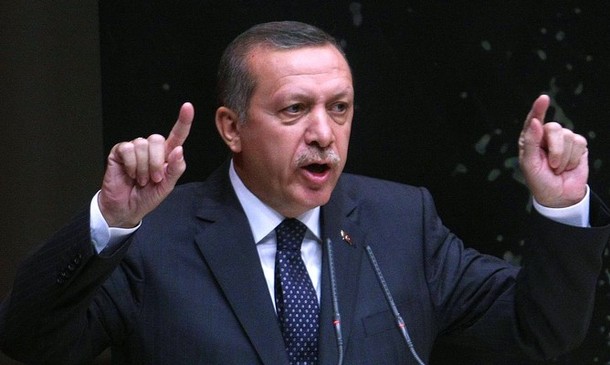
From Paul Richter, the Los Angeles Times: In the space of a few weeks this summer, Turkish Prime Minister Recep Tayyip Erdogan slammed President Obama’s approach to Mideast peacemaking, threatened to block U.S. business from drilling for oil and gas in the Mediterranean, and warned he might mobilize Turkish warships to protect activists sailing to Gaza against America’s chief regional ally, Israel.
Yet when Obama met Erdogan on the sidelines of the United Nations General Assembly meeting last month, he once again gave him more face time than any other world leader. Erdogan, Obama declared as the two headed to a 105-minute meeting, "has shown great leadership."
The attention lavished on the leader of Turkey reflects the importance of the moderate Muslim power to an administration seeking to retain influence in a turbulent part of the world. Many Obama advisors see Erdogan’s government, with its pro-business bent and tolerance for secular expression, as a possible model for others in the Middle East. The president has logged more phone calls to Erdogan than to any world leader except British Prime Minister David Cameron.
Yet Erdogan’s mercurial temperament and propensity for rhetorical threats makes dealing with him an awkward challenge. . . .
Obama has used virtually every diplomatic tactic available to deal with a partner he considers indispensable but doesn’t always understand. He has tried sweeteners, such as drone aircraft to spy on Kurdish militants. And he has resorted to flattery: He phoned Erdogan last year to rave about a Turkish basketball tournament.
But at other times he has felt compelled to be blunt, such as when he complained in a two-hour meeting with Erdogan last year about Turkey’s vote against proposed United Nations sanctions on Iran.
Adding to the friction, Turkey’s conflict with Israel and other moves have begun to mobilize opposition in the U.S.
A bipartisan group of seven senators, including Charles E. Schumer (D-N.Y.), No. 3 in the Democratic Senate leadership, wrote Obama to demand a U.S. response to Turkish moves that "call into question its commitment to the NATO alliance, threaten regional stability and undermine U.S. interests." U.S. officials have warned the Turks that Congress could try to block access to weapons it badly wants. . . .
Turkey has been caught between its desires to remain a member in good standing of the North Atlantic Treaty Organization and to strengthen its economic and political ties to Iran.
It balked for months at NATO’s request to accept a defense radar on its territory for a system aimed at blocking the missile threat from Iran. Last month it agreed to accept a U.S.-built site, to the delight of U.S. officials.
But that came only after NATO officials made it clear, said one alliance official, that "if we didn’t put it there, we’d just put it in another country nearby." Turkish officials continue to publicly insist that data from the radar won’t be provided to Israel — though U.S. officials say it will. . . .
U.S. officials say they stay in close touch with Turkey, in part to avoid surprises. Last year, for example, Pentagon officials were alarmed to learn that Turkey had conducted military exercises with China, with no advance notice, raising questions about its plans with NATO. (photo: Getty)
Image: getty%2010%2011%2011%20Recep%20Tayyip%20Erdogan.jpg
